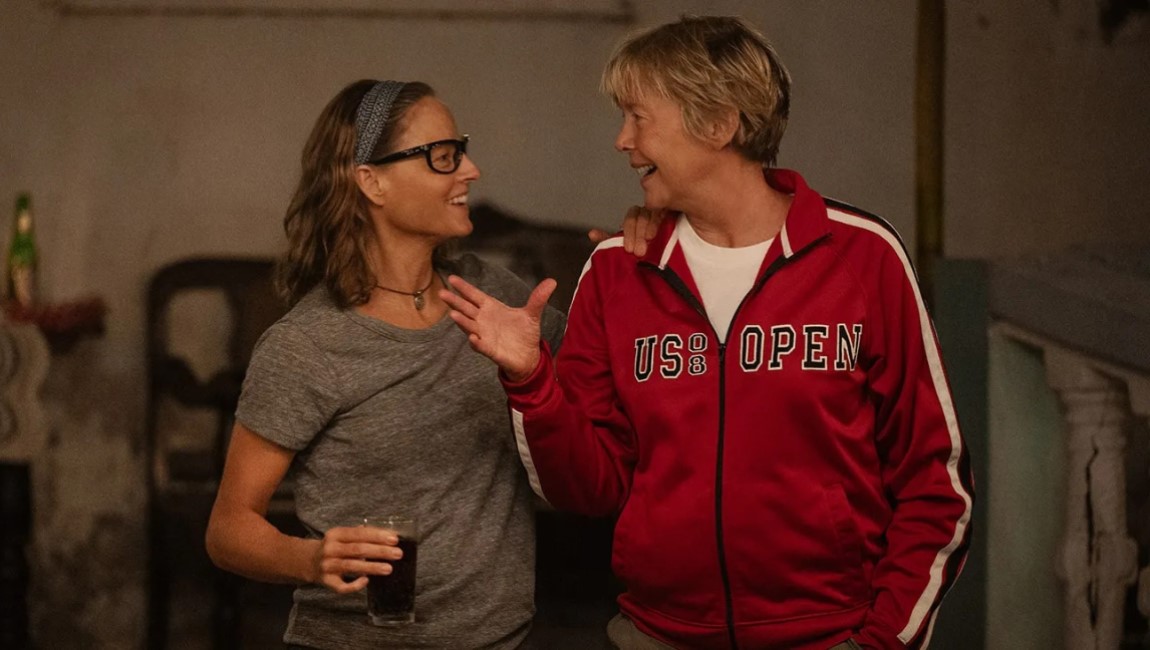The most revealing — in more ways than one — moment in Nyad, a biopic of the sixty-something marathon swimmer Diana Nyad, is a prolonged shot of her nude body, shown from behind during the film’s end credits. Taken at some point during the swimmer’s extensive media tour back in the early 2010s, in the aftermath of her becoming the first person to successfully swim the 103 miles of shark- and jellyfish-infested waters between Cuba and the Florida Keys continuously, the “tasteful nude” emphasizes the tan lines of Diana’s swimsuit, all but branded into her tanned skin, as well as her rock-solid physique — despite being only a handful of years away from senior citizen status. It’s also, in a very literal sense, Diana showing her ass to the world, which is an apt way of describing the events that transpired in the Atlantic Ocean between 2011 and 2013 along with the feature film from Elizabeth Chai Vasarhelyi and Jimmy Chin (The Rescue) made to commemorate it.
Far from a glowing hagiography, Nyad acknowledges what an absolute pill its subject is and the giant energy drain being her friend must be. Loud, self-involved, opinionated about everything and everyone, Diana Nyad has been a public figure in some form or another since the mid-70s when she first undertook a series of long-distance swimming feats/stunts that culminated with her doomed 1978 attempt to swim from Cuba to the southernmost part of the United States. After failing in her most ambitious endeavor (swimming only half the distance she set out to, before veering off course and needing to be pulled from the water with exposure), Diana hung up the goggles and swimsuit and became a successful sports media personality. But like George Foreman before her, she felt a fire still burning in her, decades after retiring from sport and, at the age of sixty, began training to finish what she’d started thirty years earlier.
Diana is played by Annette Bening in a physically demanding, uninviting-by-design performance. Long and lean with an unflattering pageboy haircut and spurning makeup, she claims to hate being the center of attention but appears deep down to relish it (she makes a big show of not wanting a 60th birthday party but holds court, boring her guests with her bloviating when her friends throw her one anyway). More than anything though, Diana lives to prove her doubters wrong; when she tells her best friend and platonic soulmate, Bonnie (Jodie Foster, similarly ripped albeit giving a far less abrasive performance), of her plan to resume training, her friend’s understandable skepticism only drives her harder. Once she gets Bonnie on board as her trainer — which in this context is a combination of co-producer and emotional support animal — the duo relocate to Sint Maarten, assembling a rag-tag team to prepare for an act of physical endurance that nobody has ever accomplished.
For those not familiar with Diana’s story (or perhaps have forgotten; it’s been a long, almost-fifteen years), the most shocking thing that happens in Nyad arrives around the one-hour mark. Accompanied by much local fanfare and worldwide media coverage, Diana triumphantly jumps into the water in Cuba to undertake her journey… only to be yanked out, practically against her will, a few dozen miles away. For while Nyad is ultimately about Diana’s triumph in 2013, the film dedicates most of its runtime to watching her fail, time and time again (four of them to be exact), only to pick herself back up and bully her friends and loved ones into going through it all over again until she finally succeeds. It would be inspiring if it wasn’t so deranged, with the swimmer being spared the quixotic label simply because she actually, somehow, pulled it off on the fifth attempt. The film is trying to walk a tightrope between celebrating Diana for never quitting and trying to convey how selfish that sort of mindset can be. It’s fair to question whether the psychological and financial cost on those who support her might start to outweigh whatever sense of accomplishment she may personally feel, or certainly would be the case if she ever paused to really consider the needs of others. There’s also the niggling matter of why anyone should especially care whether someone swims a hundred miles as though this somewhat arbitrary distance was one of the great physical barriers man had yet to crash through. Sir Edmund Hillary famously said he climbed Everest “because it was there,” but how might history remember him if Tenzing Norgay had to drag him halfway down the mountain four times before he finally made it to the top?
Vasarhelyi and Chin’s Academy Award-winning documentary, Free Solo, likewise depicted a likely reckless pursuit of immortality through the death-defying accomplishments of its subject, free-climber Alex Honnold; that film similarly considered the emotional toll his personal passion took on his loved ones. But Honnold was inward and inscrutable whereas Diana, in the long tradition of mediocre biopics, can’t stop herself from expounding on her motivations. Bening gets to yell, cry, curse and do much “capital A” acting for the cause. We watch her reflect at length on the adulterous father who propped her up as a child, only to then abandon her family as well as seethe at the thought of anyone swooping in and stealing the spotlight away from her (when a pretty young Australian woman attempts the Cuba to Florida swim while Diana recuperates, she and Bonnie sit around tracking the voyage over the Internet like a couple Mean Girls, whooping it up when the younger woman herself needs to be pulled from the water). The film also explicitly ties Diana’s need to excel to her history of sexual abuse as a young teenager, which appears to have been taken directly from her autobiography but still feels pretty reductive in this context. It’s perhaps for this reason that, for all the character’s undeniable narcissism and faults, Nyad feels uncomfortable framing Diana as monstrously self-absorbed, even fending off criticisms of her relentlessness as being gendered (for the record, a man in his sixties attempting this would be just as pointless). And in the casting of Bening it lends the entire performance an unfortunate meta-component, particularly as it becomes clear that Diana is just going to keep doing this over and over again until she’s able to drag herself over the finish line. The number of times Bening has been nominated for an Oscar and come up *just* short: also four.
Befitting the work of two documentarians, the film is at its most effective simply when addressing the multitude of small logistical challenges that need to be solved in order for Diana to make the hundred-mile journey. Whether it’s maintaining an exacting stroke rate to counter strong ocean currents, designing a synthetic mask that will protect Diana from potentially fatal jellyfish stings, or simply figuring out how to get food and electrolytes into her without letting her touch the boat (thus disqualifying her), the film is most rewarding when it’s simply about the minute-by-minute challenge of not dying in the middle of the ocean. But the fundamental problem is that there’s nothing particularly compelling about watching someone swim for long periods of time (the filmmakers’ Thai cave rescue doc even elided this element more often than not); it’s an inherently repetitive, solitary act, and the ocean doesn’t afford many opportunities for dynamic or diverse styles of compositions. And when the filmmakers do attempt to shake things up — applying a light shimmer to flashbacks as though they were being viewed from under the water, a fantasy sequence where Diana hallucinates an almost Little Mermaid-like universe beneath the surface of the ocean — the brazenness of their conceits are mitigated by the crumminess of their execution. In the end, the most commendable thing about Nyad is what makes it the hardest to recommend: the film refuses to sand down the edges of a very difficult person. It’s admirable in theory, but it also means placing yourself in the company of a relentless self-promoter and egomaniac at feature-length, contending with the film’s ultimate vindication of its means by way of their ends. Never has the fallacy of “don’t give up on your dreams” been so apparent.
DIRECTOR: Jimmy Chin, Elizabeth Chai Vasarhelyi; CAST: Annette Bening, Jodie Foster, Rhys Ifans; DISTRIBUTOR: Netflix; STREAMING: November 3; RUNTIME: 2 hr. 1 min.







